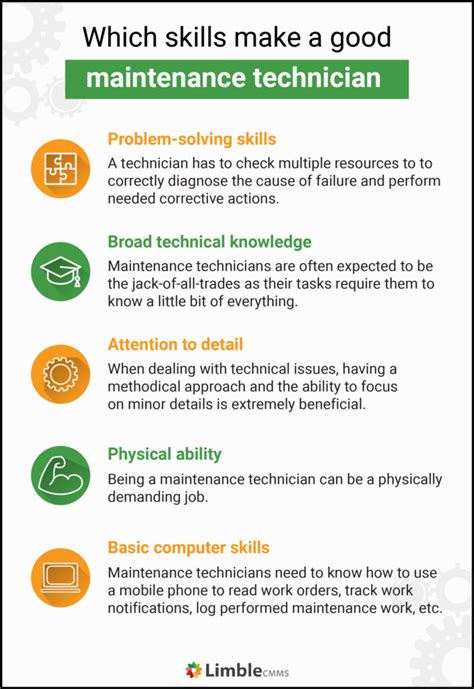As a crucial part of any organization, facilities management plays a vital role in ensuring the smooth operation of a company's physical assets and infrastructure. One of the most important positions in facilities management is the facilities technician, also known as a facilities tech or facilities engineer. In this article, we will delve into the five key roles of a facilities tech job, highlighting the responsibilities, skills, and qualifications required for this critical position.
The role of a facilities tech is multifaceted, and their responsibilities can vary depending on the organization, industry, and specific job requirements. However, there are five key areas that a facilities tech typically focuses on:
Role 1: Maintenance and Repairs

One of the primary responsibilities of a facilities tech is to perform routine maintenance and repairs on equipment, machinery, and infrastructure. This includes tasks such as troubleshooting, inspecting, and replacing faulty components, as well as performing preventive maintenance to minimize downtime and extend the lifespan of assets.
To excel in this role, a facilities tech should possess strong technical skills, including knowledge of mechanical, electrical, and plumbing systems. They should also be familiar with industry-specific regulations and codes, such as OSHA and EPA guidelines.
Key Skills and Qualifications:
- Technical training in a relevant field (e.g., HVAC, electrical, plumbing)
- Familiarity with industry-specific regulations and codes
- Strong problem-solving and analytical skills
- Ability to work independently and as part of a team
Role 2: Energy Management and Sustainability

Facilities techs play a crucial role in reducing energy consumption and promoting sustainability within an organization. This involves monitoring energy usage, identifying areas for improvement, and implementing energy-efficient solutions.
To succeed in this role, a facilities tech should have a solid understanding of energy management principles, including energy auditing, benchmarking, and reporting. They should also be familiar with sustainable practices and technologies, such as LED lighting, solar panels, and energy-efficient HVAC systems.
Key Skills and Qualifications:
- Knowledge of energy management principles and sustainable practices
- Familiarity with energy-efficient technologies and solutions
- Analytical and problem-solving skills
- Ability to communicate effectively with stakeholders
Role 3: Space Planning and Management

Facilities techs are responsible for ensuring that a company's physical space is optimized for productivity, safety, and efficiency. This involves space planning, layout design, and management of facilities, including offices, warehouses, and other work areas.
To excel in this role, a facilities tech should possess strong spatial reasoning and design skills, including knowledge of CAD software and space planning principles. They should also be able to communicate effectively with stakeholders, including employees, managers, and external vendors.
Key Skills and Qualifications:
- Knowledge of space planning principles and CAD software
- Familiarity with building codes and regulations
- Strong communication and project management skills
- Ability to work collaboratively with stakeholders
Role 4: Safety and Risk Management

Facilities techs play a critical role in ensuring the safety and well-being of employees, visitors, and contractors. This involves conducting safety inspections, identifying potential hazards, and implementing risk management strategies to mitigate these risks.
To succeed in this role, a facilities tech should possess strong knowledge of safety regulations and protocols, including OSHA guidelines and emergency response procedures. They should also be able to communicate effectively with stakeholders and provide training on safety procedures.
Key Skills and Qualifications:
- Knowledge of safety regulations and protocols
- Familiarity with emergency response procedures
- Strong communication and training skills
- Ability to identify and mitigate potential hazards
Role 5: Budgeting and Cost Control

Facilities techs are responsible for managing budgets and controlling costs associated with facilities maintenance, repairs, and upgrades. This involves developing budget plans, tracking expenses, and identifying areas for cost savings.
To excel in this role, a facilities tech should possess strong financial management skills, including knowledge of budgeting principles and cost accounting. They should also be able to analyze data and provide recommendations for cost savings.
Key Skills and Qualifications:
- Knowledge of budgeting principles and cost accounting
- Familiarity with financial management software
- Strong analytical and problem-solving skills
- Ability to communicate effectively with stakeholders






In conclusion, the role of a facilities tech is multifaceted and critical to the success of any organization. By possessing the key skills and qualifications outlined above, a facilities tech can excel in their role and make a significant impact on the safety, efficiency, and productivity of a company's physical assets and infrastructure.
